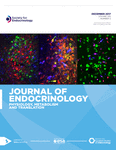Androgen-replacement therapy depresses the ex vivo production of inflammatory cytokines by circulating antigen-presenting cells in aging type-2 diabetic men with partial androgen deficiency
- Servicio de Endocrinología, Hospital Universitario de Salamanca, Paseo de San Vicente 58-182, 37007 Salamanca, Spain
- 1Servicio General de Citometría and Servicio de Endocrinología, Departamento de Medicina, Universidad de Salamanca, Spain
- (Requests for offprints should be addressed to J J Corrales; Email: corrales{at}usal.es)
Abstract
Androgens are considered to have immunomodulatory effects but their cellular mechanisms of action remain largely unknown. In the present study we prospectively analyzed the serial effects of androgen-replacement therapy on both the distribution of peripheral blood lymphocytes, monocytes and dendritic cells as well as on the production of interleukin (IL)-1β, IL-6 and tumor necrosis factor α (TNFα) inflammatory cytokines by circulating monocytes and CD33 myeloid, CD16 and plasmacytoid dendritic cell subsets, the most potent antigen-presenting cells (APCs) in type-2 diabetic men with partial androgen deficiency. Analyses were performed before therapy and at 1, 3, 6 and 12 months after treatment with 150 mg testosterone enanthate every 2 weeks in a group of 13 type-2 diabetic men. Our results show for the first time that testosterone-replacement therapy is associated with a reduction or complete abrogation of spontaneous ex vivo production of IL-1β, IL-6 and TNFα by APCs. Meanwhile, the in vitro production of inflammatory cytokines by these cells after stimulation with lipopolysaccharide plus recombinant human interferon-γ remained unchanged, suggesting that APCs preserve their constitutive machinery to produce inflammatory cytokines under androgen treatment. These results confirm and extend previous observations about the anti-inflammatory effects of androgen therapy on APCs in a new, previously unexplored model of androgen deficiency; namely, aging type-2 diabetic men. A decreased production of inflammatory cytokines by APCs might have important consequences for sex differences in susceptibility to autoimmune diseases, inflammatory response to injury and atheromatosis.
- Received in final form 8 March 2006
- Accepted 16 March 2006
- Accepted 22 March 2006
- Made available online as an Accepted Preprint 22 March 2006
- © 2006 Society for Endocrinology











